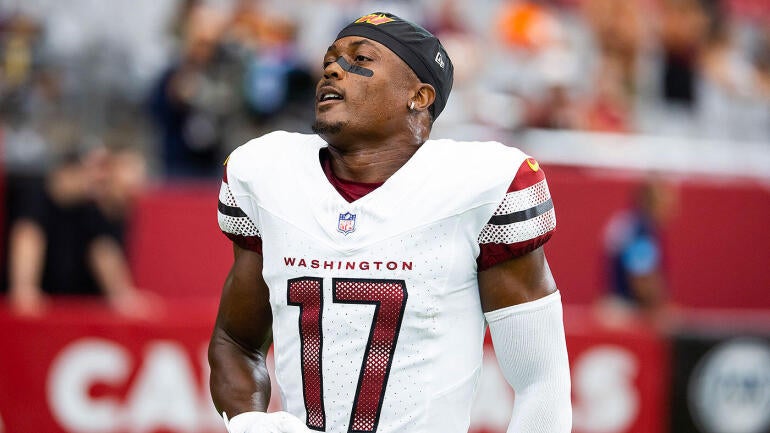
Agent's Take: A unique compromise that could end the Commanders-Terry McLaurin contract dispute
Here's how both sides can walk away smiling

The Washington Commanders and Terry McLaurin haven't made a lot a progress on a new deal that would keep the Pro Bowl wide receiver in the fold beyond the 2025 season. McLaurin is in the final year of a three-year, $69.6 million contract extension, averaging $23.2 million per year, signed at the end of June 2022. Salary escalators and incentives tied to being selected to the Pro Bowl on the original ballot made the deal worth up to $70.6 million.
McLaurin is believed to be seeking a contract in excess of the four-year extension, averaging nearly $33 million per year, DK Metcalf received from the Pittsburgh Steelers in connection with his March trade from the Seattle Seahawks. The Commanders haven't been willing to come close to Metcalf's deal.
My understanding is the Commanders have been in the same neighborhood as the $26 million-per-year maximum value of the two-year contract Mike Evans signed in March 2024 to return to the Tampa Bay Buccaneers. The base value is $41 million over two years to average $20.5 million per year. Evans turned 31 shortly before the start of the 2024 regular season.
McLaurin missed part of Washington's voluntary offseason workouts and subjected himself to a $104,768 fine by skipping the mandatory minicamp in June, since progress wasn't being made on a new contract. These absences cost McLaurin his $500,000 workout bonus because he didn't satisfy the requirements to earn the money. McLaurin was originally scheduled to make $19.65 million in 2025 on a $25.5 million salary cap number.
McLaurin's dissatisfaction with his contract prompted a brief training camp holdout where a mandatory $50,000 fine was incurred for each of the four days he missed. He hasn't practiced since ending his holdout but technically isn't holding in. McLaurin can't practice because he hasn't passed his preseason physical and is on the physically unable to perform list with an ankle injury.
Frustration with his contract situation led to McLaurin requesting a trade a couple of weeks ago although his preference is to continue playing for the Commanders. Coach Dan Quinn characterized the trade request as a regular part of business. Offensive coordinator Kliff Kingsbury is starting to get antsy about McLaurin's lack of availability.

The McLaurin/Commanders contract dispute
Metcalf, who is a fellow member the 2019 draft class, was less productive than McLaurin last season. He is about two years younger than McLaurin, who will be 30 on Sept. 15, and has rare physical traits for a wide receiver.
McLaurin's age is a concern for the Commanders. There are six wide receivers who have signed contracts averaging $32 million per year or more. Metcalf, who turns 28 in December, is the oldest. A majority of the six were either 25 or close to being 25 when they signed.
McLaurin's contract extension would presumably run through the 2028 season and possibly 2029 when he is 33 and 34. Recent history suggests wide receivers have a noticeable decline in productivity during the ages McLaurin will be in an extension.
McLaurin isn't showing any signs of slowing down. He arguably had the best season of his six-year NFL career in 2024. McLaurin caught 82 passes for 1,096 yards with a career-high 13 touchdowns. He added 14 receptions, 227 yards receiving and three touchdown catches in Washington's three playoff games. All-Pro honors (second team by the Associated Press) were earned and he was named to his second Pro Bowl (original ballot on each occasion) last season.
McLaurin has been consistent and durable and has reeled off five straight 1,000-yard receiving seasons. The last time McLaurin missed a game was during the 2020 season. He has played 97 of 100 regular-season games in his NFL career.
There are two recent deals that probably confirm to the parties that their respective positions are justified. The New York Jets signed Garrett Wilson to a four-year, $130 million extension, averaging $32.5 million per year, during the middle of July. Wilson has never been named to an All-Pro team or the Pro Bowl. He is an ascending player, who is almost five years younger than McLaurin.
A couple of weeks ago, the Denver Broncos signed Courtland Sutton to a four-year, $92 million extension, averaging $23 million per year. Sutton, who turns 30 in October, had one fewer reception and 15 fewer receiving yards than McLaurin last season.
There's a big difference in the consistency between the two. Prior to 2024, Sutton's last 1,000-yard receiving season was in 2019. Until the Broncos traded Jerry Jeudy to the Cleveland Browns during the 2024 offseason, Sutton wasn't a clear-cut No. 1 wide receiver as McLaurin has been with the Commanders throughout his career.
Compromise considerations
Both sides are going to need to compromise to end the contract stalemate. An NFL team executive once told me while I was agent that neither side is happy in a fair deal. More recently, a prominent agent said the right deal is one where both sides are a little uncomfortable with the outcome. The team executive and agent were practically saying the same thing.
A unique way of helping break the impasse would be incorporating a salary escalator and salary de-escalator into the deal. These mechanisms would provide a way for McLaurin to get close to his contract demands and the Commanders to financially address their concerns about diminishing returns. In a sense, the two sides would be making a bet about McLaurin after compromising on the base value of the deal.
Numerous NFL contracts have salary escalators. Salary de-escalators are few and far between besides the type of workout program base salary de-escalators that are primarily in Dallas Cowboys veteran contracts.
The most notable salary de-escalator was in quarterback Colin Kaepernick's 2014 contract extension with the San Francisco 49ers. The salary decreases were primarily based on whether Kaepernick was named first- or second-team All-Pro by the Associated Press in the previous season. That was an extremely high threshold to prevent the de-escalator from being triggered.
The only contract I can recall to have both a salary escalator and de-escalator was wide receiver Tyler Lockett's 2018 extension with the Seattle Seahawks. Lockett's salary increase and decrease were both based on his statistical performance.
There are several data points that could be looked at in reaching a compromise value for a McLaurin extension. McLaurin is the primary receiving threat on the Commanders. Tee Higgins is the NFL's highest-paid No. 2 wide receiver. He signed a four-year, $115 million contract, averaging $28.75 million per year, in March after being designated as a franchise player by the Cincinnati Bengals for a second straight year. The deal is worth up to $121.8 million through incentives.
The NFL's current 20 highest-paid wide receivers have signed contracts with $2,043,659,280 of new money collectively for 71 new contract years to average $28,783,934 per year. The average production for these 20 wide receivers in 2024 (rounded to the nearest whole number) was 77 receptions, 994 yards receiving and seven touchdown catches in 15 games. The 20 highest-paid wide receivers in 2024 averaged 73 catches for 936 yards and seven touchdowns in 14 games.
The number decreases to $27,254,815 per year for the 25 highest-paid wide receivers. It's $2,316,659,280 in new money collectively with 85 new contract years. The average production is 75 catches for 962 yards and seven touchdowns in 14 games. The drop is to 67 receptions, 854 yards receiving and six touchdowns in 14 games last season with 2024's 25 highest-paid wide receivers.
Another data point to consider is the cost for the Commanders to designate McLaurin as a franchise player in 2026 if he plays out his contract. It will cost $30.2 million at a minimum with the way the 120% of prior year's salary provisions work with franchise tags. The 20% increase is primarily based on a player's salary cap number from the previous year. McLaurin's franchise tag would be $30.45 million if he is named to the 2025 Pro Bowl on the original ballot because his $250,000 Pro Bowl incentive would be classified as likely to be earned and added in after calculating the increase.
The first two years of the deal, 2025 and 2026, would likely be fully guaranteed at signing regardless of the compromise value's average yearly salary. The vesting of a third-year guarantee in 2027, if any, would be another sticking point. McLaurin will want the amount of 2027 base salary guaranteed for injury at signing to become fully guaranteed next March on the fifth day of the 2026 league year. The Commanders preference will be for such an injury guarantee to be fully guaranteed on the fifth day of the 2027 league year.
Mechanics of the salary escalator/de-escalator
McLaurin would need to continue performing at a high level to benefit from the salary escalator. He set his career high of 87 receptions in 2020. McLaurin's single-season best for receiving yards is 1,191 in 2022.
McLaurin's only season in which he didn't top 70 catches and 1,000 yards receiving was as a rookie in 2019. He had 58 catches for 919 yards in 14 games. An inability to get close to these marks where McLaurin is establishing new career lows would be appropriate for salary de-escalation.
It would be a compounding escalator and de-escalator. Any salary increase or decrease would not only apply to the following contract year but also any additional remaining years left on the contract.
Assuming a three-year extension, McLaurin's 2025 performance would determine whether his 2026, 2027 and 2028 base salaries would increase or decrease. McLaurin's achievements in 2026 would dictate 2027 and 2028 salary changes. His 2027 production would impact 2028 compensation.
To better illustrate the concept, McLaurin's 2026, 2027 and 2028 base salaries would each increase by $750,000 for 90 or more receptions during the 2025 regular season. There would also be a $750,000 increase with 1,200 yards receiving in the 2025 regular season. The total escalation would be $2 million instead for each of the years with McLaurin earning first-team All-Pro honors in 2025. The escalator would work in the same fashion for 2027 and 2028 with McLaurin's 2026 and 2027 performance being determinative.
McLaurin has never reached these statistical levels during his career. The thresholds could be adjusted upward depending on the compromise reached on the base value of the contract.
The maximum escalation would be $12 million ($2 million in 2026, $4 million in 2027 and $6 million in 2028) over the life of the contract with McLaurin consistently getting first-team All-Pro recognition. The only time McLaurin has ever earned All-Pro honors was last season. If McLaurin wasn't a first-team All-Pro, the most that his salaries would increase is $9 million ($1.5 million in 2026, $3 million in 2027 and $4.5 million in 2028).
Failure to reach 55 receptions during the 2025 regular season would decrease McLaurin's 2026, 2027 and 2028 base salaries each by $750,000. Falling below 800 yards receiving in the 2025 regular season would decrease these salaries $750,000 as well. The de-escalator would function the same way with 2027 and 2028 but based on McLaurin's 2026 and 2027 production.
Just as with the statistical portion of the escalator, de-escalation is capped at $9 million. The reception threshold is just under McLaurin's single-season career low. The yardage mark is a little less than the average for 2024's 25 highest-paid wide receivers.
McLaurin would also have the ability to extinguish the de-escalator. Once McLaurin qualified for salary escalation, the de-escalator would void. For example, if McLaurin's 2026, 2027 and 2028 salaries escalated because of his 2025 performance, the de-escalator would no longer be in effect for the remainder of the contract.
Final thoughts
Don't expect any agreement reached by McLaurin and the Commanders to have the salary escalator/salary de-escalator concept. NFL teams typically avoid creativity in player contracts like the plague. Agents are usually philosophically opposed to mechanisms that will automatically cut a client's pay based on his productivity.
I never agreed to a contract a salary de-escalator when I was an agent. I'd like to think that under the right circumstances, I would have kept an open mind on having both a salary escalator and de-escalator rather than dismissing the idea out of hand.

















